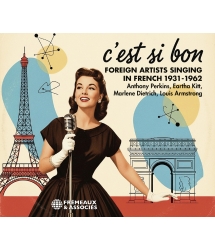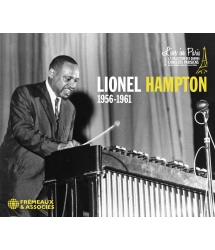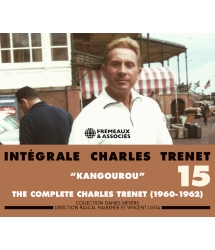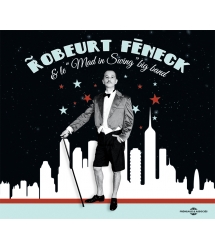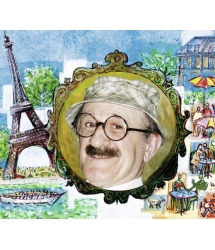- Our Catalog
- Philosophy
- Philosophers of the 20th century and today
- History of Philosophy (PUF)
- Counter-History and Brief Encyclopedia by Michel Onfray
- The philosophical work explained by Luc Ferry
- Ancient thought
- Thinkers of yesterday as seen by the philosophers of today
- Historical philosophical texts interpreted by great actors
- History
- Books (in French)
- Social science
- Historical words
- Audiobooks & Literature
- Our Catalog
- Jazz
- Blues
- Rock - Country - Cajun
- French song
- World music
- Africa
- France
- Québec / Canada
- Hawaï
- West Indies
- Caribbean
- Cuba & Afro-cubain
- Mexico
- South America
- Tango
- Brazil
- Tzigane / Gypsy
- Fado / Portugal
- Flamenco / Spain
- Yiddish / Israel
- China
- Tibet / Nepal
- Asia
- Indian Ocean / Madagascar
- Japan
- Indonesia
- Oceania
- India
- Bangladesh
- USSR / Communist songs
- World music / Miscellaneous
- Classical music
- Composers - Movie Soundtracks
- Sounds of nature
- Our Catalog
- Youth
- Philosophy
- News
- How to order ?
- Receive the catalog
- Manifesto
- Dictionnary











- Our Catalog
- Philosophy
- Philosophers of the 20th century and today
- History of Philosophy (PUF)
- Counter-History and Brief Encyclopedia by Michel Onfray
- The philosophical work explained by Luc Ferry
- Ancient thought
- Thinkers of yesterday as seen by the philosophers of today
- Historical philosophical texts interpreted by great actors
- History
- Books (in French)
- Social science
- Historical words
- Audiobooks & Literature
- Our Catalog
- Jazz
- Blues
- Rock - Country - Cajun
- French song
- World music
- Africa
- France
- Québec / Canada
- Hawaï
- West Indies
- Caribbean
- Cuba & Afro-cubain
- Mexico
- South America
- Tango
- Brazil
- Tzigane / Gypsy
- Fado / Portugal
- Flamenco / Spain
- Yiddish / Israel
- China
- Tibet / Nepal
- Asia
- Indian Ocean / Madagascar
- Japan
- Indonesia
- Oceania
- India
- Bangladesh
- USSR / Communist songs
- World music / Miscellaneous
- Classical music
- Composers - Movie Soundtracks
- Sounds of nature
- Our Catalog
- Youth
- Philosophy
- News
- How to order ?
- Receive the catalog
- Manifesto
- Dictionnary
FEAT. DAISY D’ERRATA, ARIELLE DOMBASLE & ABD AL MALIK - (1 CD original et 1 CD instrumental)
Ref.: FA8543
EAN : 3448960854320
Artistic Direction : KARL ZÉRO
Label : Frémeaux & Associés
Total duration of the pack : 1 hours 26 minutes
Nbre. CD : 2
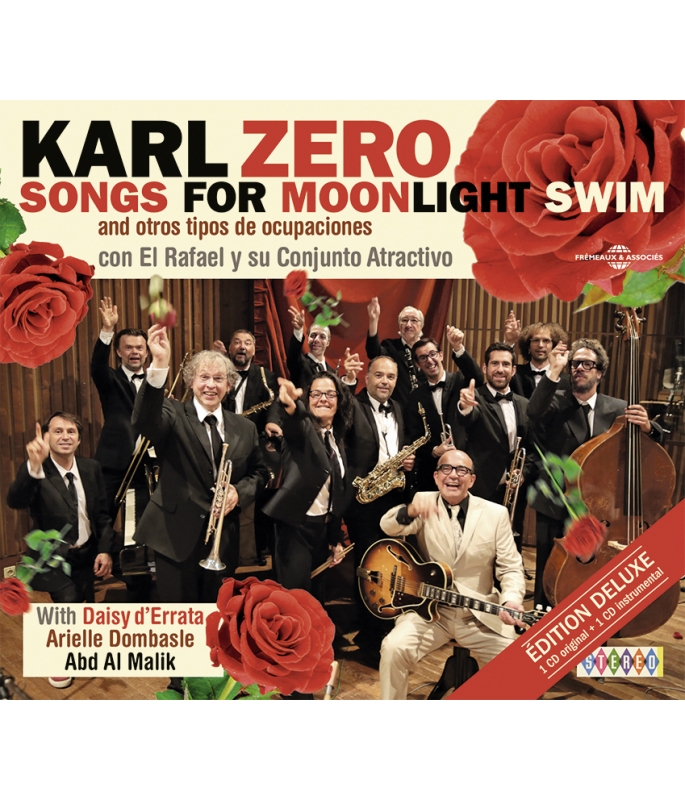
FEAT. DAISY D’ERRATA, ARIELLE DOMBASLE & ABD AL MALIK - (1 CD original et 1 CD instrumental)
FEAT. DAISY D’ERRATA, ARIELLE DOMBASLE & ABD AL MALIK - (1 CD original et 1 CD instrumental)
An incredible production of La Société Secrète. Music admirably conducted by El Rafael y su Conjunto Atractivo. Recorded and mixed by Jeff Ginouvès under the artistic direction of Karl Zéro and Raphaël Lemonnier in Studio Ferber, Paris, from august 2015 to december 2016. To perform those unforgettable songs, Karl Zéro was incredibly surrounded by Abd al Malik (Depuis que j’fume plus d’shit) Arielle Dombasle (Perque ne te vai) Daisy d’Errata (Sur deux notes, Naufrage en hiver) Eloisia da Silva (Agua na bocca, Eva Bush, J’ai besoin de toi) Natacha Fialkovsky (Pavéril Naynill’ya) Xanthoula Dakovonou (Margarita I Margaro) and Hanna Hagglund (backing vocals on Bailemos El Chapo).
-
PisteTitleMain artistAutorDurationRegistered in
-
1Allo MamboKarl ZeroRaphaël Lemmonier00:02:442017
-
2Depuis que j'fume plus d'shitKarl ZeroJulien Barthelemy00:03:172017
-
3Sur deux notesKarl ZeroPaul Misraki00:02:582017
-
4Agua na bocaKarl ZeroSerge Gainsbourg00:03:002017
-
5Perche te ne vaiKarl ZeroJose-Luis Perales00:02:482017
-
6Naufrage en hiverKarl ZeroPascale Borel00:04:082017
-
7Margarita i MargaroKarl ZeroMikis Theodorakis00:03:322017
-
8Vengo dal jazzKarl ZeroArtie Kaplan00:03:592017
-
9Bailemos el chapoKarl ZeroWilly Deville00:03:322017
-
10Markabo layl lil QahiraKarl ZeroG. McPherson00:02:572017
-
11Eva BuschKarl ZeroRalf Hutter00:03:342017
-
12Paveril (Naynill ya)Karl ZeroMarco Soncini00:02:272017
-
13J'ai besoin de toiKarl ZeroGordon Sumner00:04:312017
-
PisteTitleMain artistAutorDurationRegistered in
-
1Allo Mambo 2Karl ZeroRaphaël Lemmonier00:02:362017
-
2Depuis que j'fume plus d'shit 2Karl ZeroJulien Barthelemy00:03:162017
-
3Sur deux notes 2Karl ZeroPaul Misraki00:02:562017
-
4Agua na boca 2Karl ZeroSerge Gainsbourg00:02:582017
-
5Perche te ne vai 2Karl ZeroJose-Luis Perales00:02:462017
-
6Naufrage en hiver 2Karl ZeroPascale Borel00:04:082017
-
7Margarita i Margaro 2Karl ZeroMikis Theodorakis00:03:282017
-
8Vengo dal jazz 2Karl ZeroArtie Kaplan00:03:492017
-
9Bailemos el chapo 2Karl ZeroWilly Deville00:03:302017
-
10Markabo layl lil Qahira 2Karl ZeroG. McPherson00:02:562017
-
11Eva Busch 2Karl ZeroRalf Hutter00:03:342017
-
12Paveril (Naynill ya) 2Karl ZeroMarco Soncini00:02:272017
-
13J'ai besoin de toi 2Karl ZeroGordon Sumner00:04:312017
Karl Zéro DELUXE FA8543
Karl Zero
con El Rafael y su Conjunto Atractivo
Songs for Moonlight Swim
and otros tipos de ocupaciones
With Daisy d’Errata
Arielle Dombasle
Abd Al Malik
Recorded and mixed by Jeff Ginouvès under the artistic direction of Karl Zéro
and Raphaël Lemonnier in Studio Ferber, Paris, from august 2015 to december 2016. Mastering by Raphaël Jonin.
01 ALLO MAMBO
02 Depuis que j’fume plus d’shit (with Abd Al Malik)
03 Sur deux notes (with Daisy d’Errata)
04 AGUA NA BOCA
05 Perché te ne vai (with Arielle Dombasle)
06 Naufrage en hiver (with Daisy d’Errata)
07 MARGARITA I MARGARO
08 Vengo dal Jazz
09 Bailemos El Chapo
10 MARKABO LAYL LIL QAHIRA
11 Eva Busch
12 Pavéril (Naynill’ya)
13 J’AI BESOIN DE TOI
Rafael y su Conjunto Atractivo is composed of 16 outstanding musicians :
Raphaël Lemonnier - piano, celesta
Michael Joussein - trombone
Pierre Guicquero - trombone
Erick Poirier - trumpet
Rainer Lorenz - trumpet
Eric Levrard - saxophone, clarinet
Frédéric Couderc - saxophone, clarinet, flute
Claudio de Queroz - saxophone, clarinet, flute
Eva Slongo - violin
Jérémie Levi - violin
Raphaël Dever - bass, tuba
Slim Pezin - guitars, banjo, mandolin
Julie Saury - drums, percussion
Inor Esteban Sotolongo - percussion
Marc Simon - xylophone
Florentino Calvo - bouzouki, mandolin
Additional sounds by Karl Zéro
01. ALLO MAMBO 2’46
(Raphaël Lemmonier / Karl Zero © Editions Frémeaux & Associés)
Le titre qui ouvre ce troisième opus de ma courte carrière de « french crooner » (après le très cha-cha-cha « Songs for cabriolets », en compagnie du maestro Alexandre Desplat et le définitivement roots jamaïcain « Hifi- Calypso » avec The Wailers) est une composition de mon ami Raphaël Lemmonier, jazzman émérite, âme musicale de cet album et adorateur, comme votre serviteur, des Xavier Cugat et autres Perez Prado. Par une habile série de coups de fil passés aux quatre coins du monde, j’y cherche… le Mambo ! En vain. Une époque, un son, une ambiance disparus auxquels je vais donc m’atteler à rendre hommage, entouré d’un big-band constitué de la crème des musiciens, jouant tous ensemble comme à l’époque et comme il se doit ! Cette quête ouvre le « French World Tour », concept de cet album, french tant l’accent y est irrémédiablement présent, et world tour parce qu’il va nous conduire dans une virée foutraque à travers un espace-temps curieux, où des hits d’hier se retrouvent estampillés d’avant-hier, et chantés dans une autre langue. Comme si j’en avais retrouvé les versions originales que - réincarnation oblige - j’aurais interprété lors de vies antérieures, dans d’autres pays, mais tout en restant français ! Bon, raconté comme ça, il est clair que… ça ne l’est pas. Mais en écoutant, je gage que vous allez tout de suite comprendre…
The title that opens this third opus in my career as a “French crooner” — after the very cha-cha-cha “Songs for cabriolets” in the company of Maestro Alexandre Desplat and the definitively Jamaican/roots “HiFi-Calypso” with The Wailers — is a composition by my friend Raphaël Lemmonier, an outstanding jazzman, the musical soul of this album and a worshipper (with yours truly) of the likes of Xavier Cugat and Perez Prado. In this title, thanks to some clever phone calls made around the globe, I begin my quest for… Mambo! In vain. Here I get down to the task of paying homage to a period, a sound and an atmosphere that is long gone, surrounded by a big band of cream-of-the-crop musicians all playing together like in the bands of the period (as they should!) This quest opens the “French World Tour” concept behind the album, and I say French due to its incurably omnipresent accent and World Tour because it takes us on a crazy spree through a strange space and time continuum where yesterday’s hits are branded “day before yesterday” and sung in another language. It’s as if I’d found original versions and been obliged by reincarnation to sing them in former lives, and in other countries, while still remaining French at the same time! Well, if I put it that way then it’s clear it’s… not clear at all. I bet that if you listen, however, you’ll know what I mean immediately
Allo Mambo ?
Nous regrettons de ne pouvoir donner suite à votre appel…
Oh mais je vais t’montrer moi !
Le mambo que vous avez demandé n’est plus attribué…
Mambo please ?
This style of music does not still exist…
Allo Mambo ?
Mambu lm yaeud min almaluf…
Ola Mambo ?
El mambo ya no existe favor de verificarlo…
Pronto mambo?
Non ci sono mambo al numero richiesto…
Mambo francamente que fazemos nós nunca solicitar…
Non mais c’est quoi ça?
Eh la !
Mambo pou zitísate den eínai Éllines…
Le mambo que vous recherchez est passé de mode depuis belle lurette…
No mambo ? No problemo !
Now, welcome in Karl Zero’s French world tour !
02. Depuis que j’fume plus d’shit
(with Abd Al Malik) 3’17
D’après “Je fume pu d’shit”
(Julien Barthélémy © Etic System)
Adaptation : Abd Al Malik/Karl Zero
Arrangements : Raphaël Lemonnier /François Biensan
- Depuis que j’fume plus d’herbe
Je m’rappelle de mes rêves
J’ai pris conscience que le temps passe
Et que la vie est brève
- T’es bien dans la rue
T’es bien dans ta tête
Et dans tes sweats et tes pulls
Tu n’fais plus de trou d’boulettes
- Je fais du sport
J’ me lève à six heures
Finies les grasses mat’ interminables
Jusqu’à quatre heures
- Oui, t’es plus vif
J’te trouve plus stylé
T’as plus les yeux rouges
Le teint pâle et l’air éclaté
- Depuis que j’fume plus d’shit
J’ai d’la conversation
Je ne suis plus tout seul dans mon coin
A flipper comme un con
- Maintenant t’abordes les meufs
Sans t’casser la tête
Depuis que t’as arrêté les joints
J’te sens moins bête
- J’me sens léger
Comme un albatros
Finies les r’cherches à quatre pattes
Pour un tout p’tit bout de matos
J’ai la pêche
J’suis plus sympa
Finie la drogue perdue au fond de mon pyjama
- Depuis que tu n’fumes plus d’weed
T’as plus le regard d’un naze
Tu vas plus à Pôle Emploi
Maintenant enfin tu taffes
- J’suis vraiment positif
J’fais du ukulélé
Depuis que j’ai arrête les spliffs
J’ai éteint ma télé
- T’es tranquille
Bien la famille !
Finie la thune jetée en l’air
Pour du Tchernobyl
- J’suis moins mou
J’n’ai plus peur du tout
Finies les heures
Obnubilé par un tout petit bout
- Depuis qu’j’n’fume plus d’herbe
- Depuis qu’tu n’fumes plus d’shit
- Depuis qu’j’n’fume plus d’weed
- Depuis qu’tu n’fumes plus d’shit
- Depuis qu’j’n’fume plus d’herbe
- Depuis qu’tu n’fumes plus d’weed
- Depuis qu’j’ne fume plus d’shit
- Depuis qu’tu n’fumes plus d’herbe
- Depuis qu’j’n’fume plus d’weed
- Depuis qu’tu n’fumes plus d’herbe
- Depuis qu’j’n’fume plus d’herbe
- Depuis qu’tu n’fumes plus d’shit
- Depuis qu’j’n’fume plus d’herbe
- Depuis qu’tu n’fumes plus d’shit
- Depuis que je fume du crack !
Ce sont mes enfants qui m’ont fait découvrir cette magnifique ritournelle de l’inclassable « Crew » culte Stupéflip, à laquelle feu mon ami Jacno avait ajouté sa touche synthétique inimitable. La fraîcheur du texte en français étant imparable, je l’ai conservé pour l’essentiel, demandant au grandiose Abd Al Malik - mon maître en Soufisme - de venir faire claquer les mots, en commentant comme seul lui sait le faire ma courageuse décision d’arrêter le cannabis… Ce qui, presque dix ans après l’album susnommé en compagnie des Wailers, me semblait impératif !
My children are responsible for my discovery of this magnificent ditty — by the unclassifiable cult-“crew” called Stupéflip — to which my late friend Jacno added his inimitable synthetic touch. Since there was no answer to the freshness of the original French lyrics, I kept most of them and asked the grandiose Abd Al Malik — my master in all things Sufi — to come and make the words smack, and comment (as only he knows how) on my brave decision to quit cannabis. His presence, almost ten years after the above-mentioned album with The Wailers, seemed imperative!
D’après “Sur deux notes”
(Paul Misraki © Warner Chappell Music France)
Adaptation : Eric Tellenne / Karl Zero
Arrangements : Raphaël Lemonnier/François Biensan
You d’like me to sing you a beautiful song
But I don’t know so much about music
I might take some solfeggio lessons
Follow concerts with philharmonics
But i would just turn pathetic, boring, kind of a fiasco
So now
With your kind listening I’ll do my best and I will sing
With two notes
I’m telling you I love you
With three notes
I give you all my heart
With four notes
I should unfold the theme
Playing on the whole scale
I’ll sing a joy supreme
With two notes
I can express our foundling
With three notes
Love that blossoms like spring
With four notes
Our mutual longing
Playing on the whole scale
My song reaches its end
Moi je trouve qu’elle est trop vite faite
Ben vois-tu, j’suis déçu
J’en connais de beaucoup plus bêtes
Qui ont plu
Si tu veux que je te le prouve
Ecoute-moi sans t’fâcher !
Faut chercher jusqu’à ce qu’on y trouve un sens caché.
The two notes
C’est ta vie et la mienne
The three notes
C’est nous et notre amour
The four notes
Sont nos mains qui se tiennent
Et puis toute la gamme
Se traduit par: toujours
Oh yes! Now I can see the beauty in your song…
And I feel how deep it’s made for you and me!
Elle est faite pour nous !
Car je t’aime, et tu m’aimes
Toujours de même jusqu’au bout
Sur deux notes
Sur trois notes
Sur quatre notes
Et c’est tout
Fort d’un big-band de la qualité de celui qui m’accompagne, il aurait été impensable de ne pas reprendre cette sublime chanson de Paul Misraki. Compositeur attitré - et proprement génial - de Ray Ventura, puis de moult bandes originales pour le cinéma, Misraki fut aussi un ami, un fascinant retraité de la musique qui s’était reconverti dans le Christianisme, conversait avec les défunts par le biais de l’« écriture automatique » et avait la gentillesse de suivre de près ma carrière débutante. Il continue certainement du haut du ciel, et je le sens heureux que nous chantions sa chanson avec mon épouse Daisy d’Errata, tant elle ressemble à notre amour, et à notre vie.
Backed by such a quality big band as the one accompanying me here, it would have been unthinkable not to sing this sublime song by Paul Misraki. The man was a genius, the composer who partnered bandleader Ray Ventura and also wrote the music for countless film soundtracks. He was also a friend, a fascinating man who retired from music, converted to the Christian faith and had conversations with the deceased by means of “automatic writing”. He was also kind enough to follow the beginnings of my career. Probably he still does so from up in the heavens, and I can feel he’s happy that my wife Daisy d’Errata and I are singing his song, so much does it resemble our love and our lives.
04. AGUA NA BOCA 3’00
D’après “L’Eau à la bouche”
(Serge Gainsbourg/ Alain Goraguer © Warner Chappell Music France – Melody Nelson Publishing)
Adaptation : Bïa Krieger/ Karl Zero
Arrangements : Raphaël Lemonnier
Ouve a minha voz, escuta a minha prece
E o meu coração batendo que estremece
Vem que é pra não me deixar louca
Que eu tou com água na boca
Te quero segura te sinto ansioso
Te quero madura, te sinto dengosa
Vem que é pra não me deixar louca
Que tenho água na boca
Deixa escorregar teu navio
Devagar no leito do rio
E vem no meu
Que é todo seu
Se solta agora
E vamo-nos embora
Quero te saborear com muita calma
Pode se entregar sem medo,
corpo e alma
Vem que é pra não me deixar louca
Que tenho água na boca
Esta noite eu quero que você se deite
- Cette nuit près de moi tu viendras t’étendre
Que a gente se enrole, role e se deleite
-Je serai calme, je saurai t’attendre
Mas se eu parecer muito louco
- Et pour que tu ne t’effarouches
Vem e me beija na boca
- Vois, je ne prends que ta bouche
Reprendre « l’Eau à la bouche » de Gainsbourg était une gageure. Passer après le maître, même si on l’a bien connu de son vivant, et qu’on suppute qu’il ne vous en voudra pas trop, c’est comme prendre la douche en deuxième : y’ a plus d’eau chaude ! Mais l’arrangement façon « Tiki » de Raphaël, en hommage au fantasque Martin Denny, qui parfumait sa musique de cris d’oiseaux d’une jungle polynésienne imaginaire, et la voix envoutante d’Eloïsia dans ce texte adapté en portugais m’ont convaincus qu’une chaleur moite et captivante serait au rendez-vous…
Doing a version of Gainsbourg’s song “L’Eau à la bouche” was something of a challenge. Following the Master, even if you knew him well when he was still alive and presume he wouldn’t mind… it’s like being next in the shower: no more hot water! But in this Portuguese version, the “Tiki”-style arrangement by Raphaël — a tribute to the fantastic Martin Denny, who perfumed his music with bird-calls from an imaginary Polynesian jungle — and the spellbinding voice of Eloïsia convinced me that a captivating moist heat would be there to keep our appointment…
05. Perché te ne vai
(with Arielle Dombasle) 2’48
D’après “Porque te vas”
(José Luis Perales © Hispavox
S A Ediciones Musicales)
Adaptation : Giovanni-Loreto Caputo/Karl Zero
Arrangements : Raphaël Lemonnier
Nella mia finestra splende il sole
Et mon cœur…
Diventa triste contemplando la città
Pourquoi tu t’en vas ?
Perché te ne vai
Come ogni notte mi sono svegliata
Je pense à toi…
E nel mio orologio ho visto scorrere
Tutte le ore
Tutte le promesse
Se ne andrano
Mi dimenticherai
Mi dimenticherai
Alla stazione piangerò come un bambino
Perché te ne vai
Perché te ne vai
Perché te ne vai
Sotto la penombra di un lampione
Se ne andranno
Tutte le cose rimaste da dire
Pourquoi tu t’en vas ?
Vicino alle lancette di un orologio
Aspetteranno…
Tutte le ore rimaste da trascorrere
Je t’attends…
Tutte le promesse
Se ne andrano
Mi dimenticherai
Mi dimenticherai
Alla stazione piangerò come un bambino
Perché te ne vai
Perché te ne vai
Pourquoi tu t’en vas ?
Pourquoi tu t’en vas ?
Perché te ne vai
Pourquoi tu t’en vas ?
Perché te ne vai
Pourquoi tu t’en vas ?
Perché te ne vai
Si je n’ai pas le moindre souvenir du film « Cria Cuervos », je n’ai - comme la terre entière, je crois - jamais arrêté de chantonner sous la douche sa BO immémoriale « Porqué te vas ». Sa construction me faisant immanquablement penser à un succès napolitain des années 50, dans le grand style de Renato Carosone, j’ai demandé à un ami de me la traduire en italien, et à la muse cultissime Arielle Dombasle de venir me la susurrer, ce dont elle s’est acquittée comme toujours à merveille !
Even though I don’t remember the slightest thing about the film “Cria Cuervos”, I have never stopped humming the unforgettable “Porqué te vas” in the shower (like everyone else in the world, I believe.) Because the song’s construction never fails to make me think of those Fifties’ Neapolitan hits in the great Renato Carosone style, I asked a friend to translate it into Italian for me and then begged Arielle Dombasle, our cultissimo muse, to come and whisper it in my ear like sweet nothings. Which, as always, she has done absolutely marvellously!
06. Naufrage en hiver
(with Daisy d’Errata) 4’08
D’après “Naufrage en hiver”
(Pascale Borel/Gilles Czerkinsky © TECHNISONOR S A, Gregori Czerkinsky)
Adaptation : Karl Zero
Arrangements : Raphaël Lemonnier /
François Biensan
- Je m’souviens qu’un jour d’hiver tu as décidé
De m’emmener dans une maison cachée
- Tu n’voulais pas m’accompagner
Au bord de cette mer enchantée
- Mais tu m’as dit que mes yeux brillaient
Juste comme deux belles pierres oubliées
(c’est tout toi, ça !)
- Tu avais écrit mon nom sur le sable
Quand la mer, la mer a tout effacé
J’ai roulé dans tes doigts des colliers de varech
Où la nacre et le sel unissaient leur parfum
- J’ai surpris ton reflet changeant
Dans les lames de l’océan
- Dans l’écho de ta voix sucrée
J’ai bien cru que tout basculait
- Ah oui tout a basculé…
- Ah oui…
- L’océan emporte ton nom
Au hasard des vents et marées
- Dans les brumes de mes pensées
Ton beau visage s’est effacé
J’ai roulé dans tes doigts des colliers de varech
Où la nacre et le sel unissaient leur parfum
- Joli souvenir, hein ? On pourrait y retourner, non ?
- Avec joie !
- Allez je la rentre dans le GPS…
- Mais tu roules doucement !
- Et la lune est venue si vite
Je crois bien que j’ai confondu
- Tes cheveux mêlés aux algues mouillées
Tes yeux brûlant l’âme de l’océan
- Dans les fonds marins aux sables mouvants
J’ai sombré corps et âme
- Dans les fonds marins aux sables mouvants
J’ai sombré corps et âme
J’ai roulé dans tes doigts des colliers de varech
Où la nacre et le sel unissaient leur parfum
J’ai roulé dans tes doigts des colliers de varech
Où la nacre et le sel unissaient leur parfum
S’il ne devait rester de la « french touch » des 80’s qu’une chanson, ce serait définitivement celle-là. Le groupe « Mikado » qui la créa alors était composé d’un couple, comme Daisy et moi, il avait des lunettes et elle une mise-en-plis époustouflante, c’est dire si on s’identifiait ! L’orchestration transforme ici cette bluette synthétique et second degré en road-movie des 40’s, ample et smoothy, et Daisy y excelle dans la naïveté feinte !
If only one song deserved remembering from what they called the French touch in the Eighties, then it would definitely be this one. The group “Mikado” that did the song at the time was, like Daisy and I, a couple: he wore glasses and she had a stunning hair-do so, you bet we identified with them! Here the orchestration transforms this synthetic, witty, tongue-in-cheek little piece into a Forties’ road-movie that’s wide and smooth; as for the feigned innocence, Daisy is excellent!
07. MARGARITA I MARGARO 3’32
D’après “Margarita, Margaro”
(Mikis Theodorakis © Illan Melody Press –
Semi Societé)
Adaptation : Karl Zero
Arrangements : Raphaël Lemonnier
I Margarita, i Margaro, peristeraki ston ourano
Ton ourano mes sta dyo sou matia kitazo
Vlepo tin poulia ke ton asterismo
Ton ourano mes sta dyo sou matia kitazo
Vlepo tin poulia ke ton asterismo
I mana mou eine treli
Ke me klidoni monachi
Mais si je veux venir te voir
Moi j’attends la nuit quand tout est noir
Mais si je veux venir te voir
Moi j’attends le noir nous sommes réunis
I Margarita, i Margaro, varkoula sto saroniko
Saronike mou ta kymatakia sou dos’ mou
Dos’ mou t’ ageri, dos’ mou to pelago
Saronike mou ta kymatakia sou dos’ mou
Dos’ mou t’ ageri, dos’ mou to pelago
I mana mou eine treli
Ke me klidoni monachi
Mais si je veux venir te voir
Moi j’attends la nuit quand tout est noir
Car si je dois te faire l’amour
Je me dois d’attendre la fin du jour
Margarita, tonight we’ll give your mother one beer, one vino
After she will fall asleep, then your French lover will come
Oh what a kalispera night we’ll have!
I Margarita, i Margaro, dentraki sto votaniko
Pare to tram molis dis pos pefti i nychta
Peftoun i ores, pefto lipothymo
Pare to tram molis dis pos pefti i nychta
Peftoun i ores, pefto lipothymo
I mana mou eine treli
Ke me klidoni monachi
Mais si je veux venir te voir
Moi j’attends la nuit quand tout est noir
Car si je dois te faire l’amour
Je me dois d’attendre la fin du jour
Margarita
I’ll be your Margaro!
Cet hymne grec, de l’immense Mikis Theodorakis, découvert il y a bien trente ans sous le soleil des Cyclades, ne m’a jamais quitté. Il s’est donc tout naturellement imposé à moi dès lors qu’il a été question de faire ce tour du monde chanté. La Grèce est une étape obligatoire. Et dire que nous osons donner des leçons à ce peuple qui pensa tout, bien avant nous ! Mais je m’égare… Nous avons quelque peu « italianisé » la chanson pour ce qui est de l’orchestration, ajoutant çà et là des cuivres, et j’ai traduit quelques vers en français afin de prouver qu’en Mike Brandt du pauvre, je pouvais être grand.
This Greek hymn by the immense Mikis Theodorakis was discovered at least thirty years ago in the sunny Cyclades, and it’s never left me. So obviously it was a natural choice for this round-the-world trip in song. Greece was a mandatory stopover… when I think of all the lessons we dare to give the Greeks after they thought of everything long before we did! But let’s stick to the point… We have “Italianized” the song’s arrangement, adding some brass here and there, and I’ve translated some verses into French to prove that I could be great as a poor man’s Mike Brant.
08. Vengo dal Jazz 3’59
D’après “Benson Hurst Blues”
(Artie Kaplan/ Arthur Kornfeld © Thrice Music Inc – Golden Egg Music Inc – sous lic. France Melmax)
Adaptation: Adriano Celentano / Karl Zero
Arrangements : Raphaël Lemonnier/François Biensan
I needed to work I don’t have any money.
I have no future, I have nothing.
He pooled me right away, he said « come, come »
So as he did this i understood that he says « come »
Cause i did not speak a world of English…
My mother said « you always say yes.
You always say yes.
No matter what he asks you, you say yes. »
Giovane bimba
è inutile che tu
cerchi di conquistarmi
col tuo modo di fare
non devi scordare
che io vengo dal jazz
e tu sei una musica vecchia per me
se il tuo obiettivo
è di colpirmi
stai pur sicura che il cuore tu l’hai centrato già
però se io fossi in te
dubiterei di un tipo come me
perchè suonando al chiar di luna
ti tradirei
ogni cosa che muovi
del tuo fragile corpo
le mie dita sul bass
accarezzano te
ma i tuoi modi sensuali
mi incattiviscono un pò
mi dicono che
non sarai sempre così
ma io sono un jazz man
la verità già la so
ma tu non puoi capire
quindi è inutile che
tu mi tenti ancora
tanto non cederò
anche se…
pazzo son di te
Giovane bimba
io vengo dal jazz
è inutile che tu
cerchi di conquistarmi
Et dire qu’à l’origine, ce titre d’Oscar Benton fut choisi par Alain Delon comme BO d’un de ses films, « Pour la peau d’un flic » ! C’est en tout cas ainsi que je l’ai découvert pour la première fois. Le film, bon…mais la musique ! L’usage immodéré de la cigarette m’ayant conduit à perdre au moins une octave, le défi de lachanter à la façon rauque d’un d’Adriano Celentano était enfin à ma portée. L’arrangement « Cotton Club » confère à ce titre une ambiance prohibition que la voix de Madame Sophia Loren vient encore rehausser.
When you think that this Oscar Benton song was originally chosen by Alain Delon for the soundtrack of one of his films called “Pour la peau d’un flic”! That’s where I first heard it, anyway. The film’s one thing, but the music…! Inordinate consumption of cigarettes made me lose at least an octave so the challenge of singing as hoarsely as Adriano Celentano was finally within reach. The “Cotton Club” arrangement gives the title a Prohibition atmosphere to which the voice of Madame Sophia Loren can only add.
09. Bailemos El Chapo 3’32
D’après “Spanish Stroll”
(Willy deVille © Société P E C F)
Adaptation : Lupillo Rivera / Karl Zero
Arrangements : Raphaël Lemonnier
La noticia esta caliente
Arrestaron el Chapo
les gringos meten dinero
al gobierno mexicano
El narco se los triplica
eso es la regla
Si el cartel no produce l
a economia se dismorona
y la verdad se hace mas cara
la cosas nunca cambiaron
pero el señor chapo
es mas libre que une pájaro
Se evadiria de nuevo
por el aire o por el agua
se oye musica
en la sierra
porque estamos
celebrando
su tercera
evasión
desde ayer
hoy
y mañana
es Joachim Guzmàn Loera
Vamos a bailar el Chapo
El Chapo el Chapo el Chapooo !
Je devais avoir à peine quatorze ans lorsque surgit sur le petit écran de « Top of the Pops » (j’étais en séjour linguistique en Angleterre !) l’incroyable Willy Deville, sa dégaine de pirate et son rock hispanique, balançant son premier tube, l’acéré « Spanish Stroll ». Je ne m’en suis jamais remis. Ça devait être les castagnettes, ou le « talk » en espagnol…C’est si précieux de voir éclore un génie. Dès lors, comment faire autrement que de lui rendre hommage ? Ayant parallèlement fait un séjour dans l’État de Sinaloa au Mexique pour couvrir la saga édifiante d’El Chapo, le rapprochement s’est fait naturellement, et cette version « narcocorrido » est née.
I must have been barely fourteen when “Top of the Pops” was on TV in England (I was on a foreign-language visit!) and the incredible Willy Deville, looking like some Hispanic pirate rocker, burst onto the screen singing his first hit, the bitter “Spanish Stroll.” I never got over it. It must have been the castanets or all the chat in Spanish… The sight of a genius coming to full bloom is a precious thing. That said, how can you not render this homage to him? In an interesting parallel, I once paid a visit to the State of Sinaloa in Mexico to cover the edifying saga of El Chapo; the one naturally made me think of the other, and this narcocorrido version was born.
10. MARKABO LAYL LIL QAHIRA 2’57
D’après “Night Boat to Cairo”
(G. McPherson/M. Barson ©
(EMI Music Publishing France)
Adaptation : Oussama Errafay / Karl Zero
Arrangements : Raphaël Lemonnier
Inaha ennahar
Half past monsoon
Aâla defaf anil
Wa ha houa almarkab
Only half afloat
Oarsman grins a toothless smile
Aâla hadihi adefa alhazina
Al markabo l akhir aâla defaf anil
Doesn’t seem to care, no more wind in his hair
As he reaches his last half mile
The oar snaps in his hand
Qabla bolough al yabissa
Wa ma balagha assada ibtissama
Just pokes at wet sand in an oar in his hand
Wa quarara l’ibhar wa nozoul anil
Wa quarara l’ibhar
Wa nozoul anil
En faisant revivre l’épopée du ska jamaïcain des 60’s au début des années 80, Madness me fit découvrir bien plus que leur grotesque danse de la « course voutée sur place » que, jeunes et sans doute ivres, nous tentions de singer : un univers sonore qui me mènerait plus tard au steel-bands calypso. Le thème arabisant de leur composition « Night Boat to Cairo » méritait de rendre au Caire ce qui est au Caire dans un arrangement voluptueux, en hommage au Maurice Jarre de « Lawrence d’Arabie », et de reprendre la chanson en langue arabe, autant que faire se puisse. Certaines locutions anglaises étant intraduisibles en si peu de mots, elles sont restées dans la langue de Shakespeare, avec un accent digne de « Tintin au pays de l’or noir ».
In the early Eighties, when Madness brought the Jamaican ska of the Sixties back to life, the group showed me a lot more than how to do a duck walk bent backwards. We were young and probably drunk, and we tried to imitate them, but it was their sound universe that would later lead me to steel bands and calypso. The Arab-like theme from “Night Boat to Cairo” has the double merit of “rendering unto Cairo what is Cairo’s” (with a voluptuous arrangement in tribute to Maurice Jarre of “Lawrence of Arabia”), and of being a cover in an Arab language (you might as well go all the way.) Since some of the English idioms are untranslatable in as few words, well, they’ve remained in the language of Shakespeare with an accent worthy of Tintin’s “Land of Black Gold.”
11. Eva Busch 3’34
D’après “Das Model”
(© Ralf Hütter/ Emil Schult/ Karl Barton)
Adaptation : Karl Zero
Arrangements : Raphaël Lemonnier /François Biensan
Aux salons d’avant-guerre, à Paris comme à Berlin
Sur les scènes de gala de cette Europe indolente
Lorsqu’Eva paraissait, tout homme était un pantin
Rêvant Eva m’a choisi, c’est pour moi qu’elle chante
Eva dont le renom fut de briser tous les coeurs
Eva Busch dont le pouvoir était ce charme enjôleur
Détestait la guerre, ignorait le malheur
Les succès s’enchaînant, de quoi aurait-elle eu peur ?
En 1933 Eva fuit le Führer
Une nuit à l’ABC la Gestapo la rattrapa
Eva fut déportée, mais elle est toujours là
Dans mon cœur à jamais, ultime pantin admirateur
Kraftwerk est sans conteste ma formation musicale favorite depuis que mon transistor se transforma en compteur Geiger, un matin de 1974… J’avais 13 ans et leur « Radio-activity » nous plongeait dans un nouveau millénaire musical ! Ces natifs de Dusseldorf, mi-dandies mi-robots, venaient d’inventer un son purement « européen », le premier à ne rien emprunter aux anglo-saxons depuis…1910 ! Leurs mélopées froides et technologiques racontaient cet an 2000 que nous attendions avec ferveur, ils démodaient instantanément tout le reste. « Das Model », leur hit techno-pop millimétré prête à merveille sa structure à une reprise swing 40’s, dans la lignée d’un Max Raabe. Dès lors, l’image d’Eva Busch, star allemande d’avant-guerre (qui la termina dans un camp…) s’imposa à moi pour un texte en français, puisqu’elle chantait aussi dans notre langue. Un hommage à tiroirs, donc.
Kraftwerk is no doubt my favourite music group (ever since my transistor radio turned into a Geiger counter one morning in 1974.) I was thirteen when their “Radio-activity” plunged us into a new musical millennium: these natives of Dusseldorf — half dandy, half robot — had just invented a purely “European” sound, the first that hadn’t borrowed anything from the Anglo-Saxons since 1910! In that year 2000 their cold, technological melodies fervently expressed what we were waiting for, and instantaneously made everything else outmoded. “Das Model”, their perfectly calculated techno-pop hit, wonderfully lends its structure to a Forties-swing reprise in the Max Raabe tradition. So where I’m concerned it makes the image of Eva Busch, a German star pre-war (she ended it in a camp) a natural for a text in French, because she sang in French too. A homage, therefore, with various layers.
12. Pavéril (Naynill’ya) 2’27
D’après “Tu es foutu”
(Marco Soncini/Ingrid Alberini/Rafael Hernandez
© Shirim)
Adaptation: Vladimir Berkhman/Natacha Fialkovsky/ Karl Zero
Arrangements : Raphaël Lemonnier/François Biensan / Xavier Cugat
Tiébè pavéril, nayvnill’ ya
Ved’ ya abechiala tibié, a t(i) mniè paveril
Ved’ ya ,abechiala tibié, niebo i zemlia
Ved’ ya, abechiala tibié, tchoudièssa da skazki
Ved’ ya, abechiala tièbè, tol’ka t(i) niè prichla
Ti mniè pavéril
Tiébè pavéril,
Nayven’ ya
Ved’ ya abechiala tibié, soumachètchniyè notchi
Ved’ ya abechiala tibié, strasti da-a outra
Ved’ ya abechiala tibié, nejnosti da lasski
Ved’ ya abechiala tièbè, tol’ka t(i) niè prichla
Ti mniè pavéril, nayven’ ti
Niè znayou chto prayizashlo
Naverna patamouchta niè rousskill’ ya
Tiébè pavéril
I chiort s s taboy, i chiort s taboy
Boy, Boy ,boy, Boy, i chiort s taboy!!!
Tube techno-disco italien du début des années 2000, chanté en néo-français par In-grid, vénus transalpine aujourd’hui disparue, « Tu es foutu » m’a toujours fait penser, je me demande encore pourquoi, à la Russie. A l’URSS, pour être précis, période guerre froide, où dans les brumes de Berlin-Est on s’échangeait des espions sur un pont gelé. Mais la chanson originale narrant l’histoire de l’amour déçu d’une fille, j’en ai conservé la trame, en me glissant dans la peau d’un soupirant français repoussé parce qu’il n’est pas russe… Un « rouski mambo » endiablé, qui prouve que contrairement à ce que laissait entendre le premier titre, le mambo est bel et bien toujours vivant !
An Italian techno-disco smash hit from the early 2000’s, sung in neo-French by In-grid, a Transalpine Venus no longer with us, the song “Tu es foutu” has always reminded me, don’t ask me why, of Russia. Or of the USSR, to be precise, in the Cold War era when the mists of East Berlin were the scene for exchanging spies on frozen bridges. But I’ve kept the plot telling the story of a girl who’s disappointed in love, and put myself in the skin of a French suitor she rejects because he’s not a Russian… This is a boisterous Russki-mambo to prove that, unlike the idea suggested by the first title, the mambo is still very much alive!
13. J’AI BESOIN DE TOI 4’31
D’après “Can’t Stand Losing You”
(Gordon Sumner © GM Sumner –
EMI Music Publishing France)
Adaptation: Eric Tellenne/Karl Zéro
Arrangements : Raphaël Lemonnier
J’ai besoin de toi
Disais-tu tremblante
Le givre nous hante
En juillet déjà
Já amei toda esta noite.
E sinto que é verdade que a sua amiga diz.
Você não quer me ver de novo.
E teu irmão só pensa em me matar.
Eu acho isso covardia.
Mais isso não pode ficar assim.
Não posso, não posso, te perder eu
Não posso, eu não posso, te perder eu
Não posso, não posso, te perder eu
Não posso, não posso, te perder
Soleil la soupente
Eclaire un deux trois
Coeur volage en pente
Coule en un lac froid
Eu vejo que você não leu as minhas cartas.
E o CD você todo arranhou.
Não consigo nem ver nenhum horizonte.
Ninguém nunca nem está aí pra mim.
Isso não me dá confiança.
Pra que viver sem esperança.
Não posso, não posso, te perder eu
Não posso, eu não posso, te perder eu
Não posso, não posso, te perder eu
Não posso, não posso, te perder
Tes lèvres me mentent
Leur aveu tout bas
Entends la tourmente
De mon cœur qui bat
Eu acho que este é o nosso último adeus.
E não se importa que eu não vou chorar.
Mais você vai se arrepender.
Quando eu morrer a culpa é toda sua.
Você acha que é suicídio.
Mais eu não estou pronta por tanto orgulho.
Não posso, não posso, te perder eu
Não posso, eu não posso, te perder eu
Não posso, não posso, te perder eu
Não posso, não posso, te perder
Não posso, não posso, te perder eu
Não posso, eu não posso, te perder eu
Não posso, não posso, te perder eu
Não posso, não posso, te perder
Soleil au lac froid
Juillet qui me hante
Un deux trois tourmente
Tremblant givre en pente
J’ai besoin de toi
Dans « bonus-track », il y a trac… Reprendre « Police », soyons sérieux… j’avoue que j’ai très longtemps hésité. Mais Sting est un si gigantesque mélodiste, et l’arrangement de son « Can’t stand loosing you » par Raphaël Lemmonier si somptueux que j’ai accepté que ce titre vienne clore l’album. Eloïsia y campe la déchirante brésilienne abandonnée, et moi une sorte… d’Alain Cuny vénéneux, sur un très beau poème inédit de mon frère, Eric Tellenne.
In “bonus track” there’s the French word “trac” meaning stage-fright. Seriously though, doing a cover of something by Police… I confess I hesitated for ages. But Sting writes such gigantic melodies, and the arrangement of “Can’t stand losing you” by Raphaël Lemmonier is so sumptuous, that I agreed this title deserved to close the album. Here, Eloïsia acts the tear-jerking forsaken Brazilian woman, and I play a kind of pernicious Alain Cuny-type character. This is a very beautiful unpublished poem by my brother Eric Tellenne.
An incredible production of La Société Secrète. Music admirably conducted by El Rafael y su Conjunto Atractivo. Recorded and mixed by Jeff Ginouvès under the artistic direction of Karl Zéro and Raphaël Lemonnier in Studio Ferber, Paris, from august 2015 to december 2016. Mastering by Raphaël Jonin.
El Rafael y su Conjunto Atractivo is composed
of 16 outstanding musicians :
Raphaël Lemonnier - piano, celesta
Michael Joussein - trombone
Pierre Guicquero - trombone
Erick Poirier - trumpet
Rainer Lorenz - trumpet
Eric Levrard - saxophone, clarinet
Frédéric Couderc - saxophone, clarinet, flute
Claudio de Queroz - saxophone, clarinet, flute
Eva Slongo - violin
Jérémie Levi - violin
Raphaël Dever - bass, tuba
Slim Pezin - guitars, banjo, mandolin
Julie Saury - drums, percussion
Inor Esteban Sotolongo - percussion
Marc Simon - xylophone
Florentino Calvo - bouzouki, mandolin
Additional sounds by Karl Zéro
To perform those unforgettable songs, Karl Zéro was incredibly surrounded by Abd al Malik (Depuis que j’fume plus d’shit) Arielle Dombasle (Perque ne te vai) Daisy d’Errata (Sur deux notes, Naufrage en hiver) Eloisia da Silva (Agua na bocca, Eva Bush, J’ai besoin de toi) Natacha Fialkovsky (Pavéril Naynill’ya)
Xanthoula Dakovonou (Margarita I Margaro) and Hanna Hagglund (backing
vocals on Bailemos El Chapo).
Muchas Gracias to: Raphaël Lemmonier, François Biensan, Jean-Christophe
Le Guennan, Renaud Létang and all the gang of Studio Ferber, Laure Duhard of Believe and her squad, Patrick Frémeaux and his team.
All photographs : DR. Booklet designed by Karl Zero. Graphic design by Wilfrid Plence.
Cuidado con falsificaciones !
To perform those unforgettable songs, Karl Zéro was incredibly surrounded
by Abd al Malik (Depuis que j’fume plus d’shit) Arielle Dombasle (Perque ne te vai)
Daisy d’Errata (Sur deux notes, Naufrage en hiver) Eloisia da Silva (Agua na
bocca, Eva Busch, J’ai besoin de toi) Natacha Fialkovsky (Pavéril Naynill’ya)
Xanthoula Dakovonou (Margarita I Margaro) and Hanna Hagglund (backing
vocals on Bailemos El Chapo).
Muchas Gracias to: Raphaël Lemmonier, François Biensan, Jean-Christophe
Le Guennan, Renaud Létang and all the gang of Studio Ferber, Laure Duhard
of Believe and her squad, Patrick Frémeaux and his team, Alexandre Desplat.
All photographs: DR /Michel Trehet. Booklet designed by Karl Zero.
Graphic design by Wilfrid Plence.
Cuidado con falsificaciones !
Manufactured and distributed by Frémeaux & Associés
Supreme presidency: Patrick Frémeaux
Low-grade staff (‘servicios’): Augustin Bondoux
www.fremeaux.com
Digital distribution: Believe Digital
